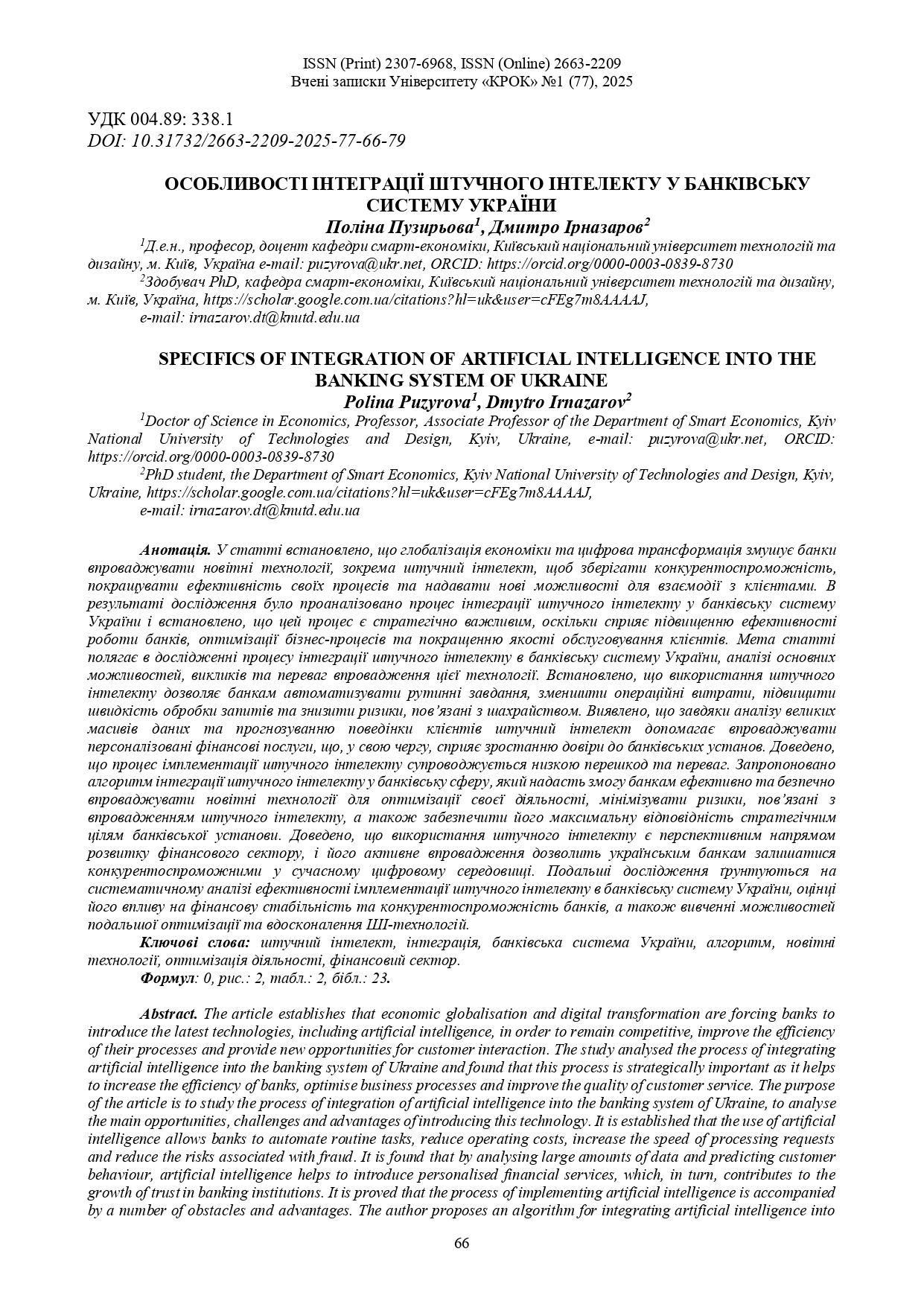SPECIFICS OF INTEGRATION OF ARTIFICIAL INTELLIGENCE INTO THE BANKING SYSTEM OF UKRAINE
DOI:
https://doi.org/10.31732/2663-2209-2025-77-66-79Keywords:
artificial intelligence, integration, banking system of Ukraine, algorithm, new technologies, optimisation of activities, financial sectorAbstract
The article establishes that economic globalisation and digital transformation are forcing banks to introduce the latest technologies, including artificial intelligence, in order to remain competitive, improve the efficiency of their processes and provide new opportunities for customer interaction. The study analysed the process of integrating artificial intelligence into the banking system of Ukraine and found that this process is strategically important as it helps to increase the efficiency of banks, optimise business processes and improve the quality of customer service. The purpose of the article is to study the process of integration of artificial intelligence into the banking system of Ukraine, to analyse the main opportunities, challenges and advantages of introducing this technology. It is established that the use of artificial intelligence allows banks to automate routine tasks, reduce operating costs, increase the speed of processing requests and reduce the risks associated with fraud. It is found that by analysing large amounts of data and predicting customer behaviour, artificial intelligence helps to introduce personalised financial services, which, in turn, contributes to the growth of trust in banking institutions. It is proved that the process of implementing artificial intelligence is accompanied by a number of obstacles and advantages. The author proposes an algorithm for integrating artificial intelligence into the banking sector, which will allow banks to effectively and safely implement the latest technologies to optimise their activities, minimise the risks associated with the introduction of artificial intelligence, and ensure its maximum compliance with the strategic goals of a banking institution. It is proved that the use of artificial intelligence is a promising area of development of the financial sector, and its active implementation will allow Ukrainian banks to remain competitive in the modern digital environment. Further research is based on a systematic analysis of the effectiveness of the implementation of artificial intelligence in the banking system of Ukraine, an assessment of its impact on the financial stability and competitiveness of banks, as well as the study of opportunities for further optimisation and improvement of AI technologies.
Downloads
References
Біленко, Д. В., Сивицька, І. Г. & Теленкова, Д. Г. (2018). Моделювання оцінки кредитоспроможності клієнтів банку за допомогою методу штучного інтелекту. Проблеми системного підходу в економіці, 3(2), 105-109. URL: http://nbuv.gov.ua/UJRN/PSPE_print_2018_3(2)__20.
Голей, Ю. М. & Дрік, І. А. (2023). Аналіз використання штучного інтелекту в системах управління бізнес-процесами: переваги та недоліки. Challenges and Issues of Modern Science, 1, 382-386. https://doi.org/10.6084/m9.figshare.22886720.
Гудзь, Л. В. (2024). Забезпечення права на приватність у контексті використання штучного інтелекту: потенційні загрози та шляхи їх подолання. Науковий вісник Ужгородського національного університету. Серія : Право, 86(1), 175-180. https://doi.org/10.24144/2307-3322.2024.86.1.25.
Зайонц, А. В. (2020). Підвищення конкурентоспроможності банку на кредитному ринку за рахунок упровадження інновацій на основі Big Data та технологій штучного інтелекту. Вчені записки Таврійського національного університету імені В. І. Вернадського. Серія : Економіка і управління, 31(70), 4(2), 69-75. https://doi.org/10.32838/2523-4803/70-4-38.
Карась, О. С. (2024). Еволюційний вплив штучного інтелекту на економіку: тенденції та ідеї. Міжнародний науковий журнал «Інтернаука». Серія : Економічні науки, 11(1), 49-55. https://doi.org/10.25313/2520-2294-2024-11-10474.
Кисіль, Т. М. (2015). Концептуальні моделі діагностики банкрутств, засновані на методах штучного інтелекту. Моделювання та інформаційні системи в економіці, 91, 274-283. URL: http://nbuv.gov.ua/UJRN/Mise_2015_91_28.
Миколайчук, Р. А. & Миколайчук, А. І. (2024). Використання технологій штучного інтелекту для автоматизації процесу обробки документів. Сучасні інформаційні технології у сфері безпеки та оборони, 2, 111-117. https://doi.org/10.33099/2311-7249/2024-50-2-111-117.
Пантєлєєва, Н. М. (2019). Технології штучного інтелекту в антикризовому управлінні банком. Науковий вісник Херсонського державного університету. Сер. : Економічні науки, 33, 193-197. https://doi.org/10.32999/ksu2307-8030/2019-33-38.
Прицюк, Л. А. (2023). Технології штучного інтелекту у банках: перспективи і застереження. Міжнародний науковий журнал «Інтернаука». Серія : Економічні науки, 4(2), 36-39. https://doi.org/10.25313/2520-2294-2023-4-8814.
Пузирьова, П. В. (2020). Основні фактори впливу на процес формування та розвитку інноваційного потенціалу інтегрованих структур бізнесу. Формування ринкових відносин в Україні, 10 (233), 72-81. https://doi.org/10.5281/zenodo.4415456.
Романчук, Л. А., Щитов, Д. М. & Мормуль, М. Ф. (2024). Застосування штучного інтелекту в електронній комерції України: тренди, виклики, імітаційні моделі. Міжнародний науковий журнал «Інтернаука». Серія : Економічні науки, 9(1), 77-88. https://doi.org/10.25313/2520-2294-2024-9-10286.
Руда, О. Л. (2024). Штучний інтелект та напрями використання в банківській діяльності. Ефективна економіка, 1, URL: http://nbuv.gov.ua/UJRN/efek_2024_1_52. http://doi.org/10.32702/2307-2105.2024.1.50.
Савіцький, Л. М., Безносенко, С. Ю. & Горбач, Р. Я. (2024). Концептуальні погляди на побудову системи захисту від кібератак із застосуванням методів штучного інтелекту в інформаційно-комунікаційних системах. Сучасні інформаційні технології у сфері безпеки та оборони, 1, 77-85. https://doi.org/10.33099/2311-7249/2024-49-1-77-85.
Соколов, В., Рябцев, В., Успенський, О. & Копич, Д. (2024). Напрями застосування штучного інтелекту в технологіях розробки програмного забезпечення. Information Technology and Security, 12(2), 219-235. https://doi.org/10.20535/2411-1031.2024.12.2.315741.
Солодкий, В. В. & Поліщук, Ю. A. (2023). Впровадження штучного інтелекту в українських банках та бізнесі: перспективи та застереження. Економічний вісник Дніпровської політехніки, 2, 119-127. https://doi.org/10.33271/ebdut/82.119.
Стащук, О. В. & Мартинюк, Р. (2021). Специфіка застосування когнітивних технологій та штучного інтелекту в сучасній банківській діяльності. Економічний форум, 3, 134-138. http://nbuv.gov.ua/UJRN/ecfor_2021_3_21.
Холявко, Н., Садчикова, І. & Колотюк, М. (2023). Напрями використання штучного інтелекту в банківських установах. Проблеми і перспективи економіки та управління, 2, 192-203. https://doi.org/10.25140/2411-5215-2023-2(34)-192-203.
Irnazarov, D. & Puzyrova, P. (2024). Theoretical concept of artificial intelligence, its impact on the modernisation of business processes and strategic development of enterprises. Менеджмент, 1(39), 78-89. https://doi.org/10.30857/2415-3206.2024.1.7.
Сайт Bank of America (2024). URL: https://promotions.bankofamerica.erica.
Сайт Barclays (2024). URL: https://www.barclays.co.uk/.
Сайт Business Insider (2024). URL: https://www.businessinsider.com.
Сайт McKinsey & Company (2024). URL: https://www.mckinsey.com.
Сайт МФУ (2024). URL: https://minfin.com.ua.

Downloads
Published
How to Cite
Issue
Section
License

This work is licensed under a Creative Commons Attribution-NonCommercial 4.0 International License.

